Welcome back to Overthinking Lost, fifth season edition.
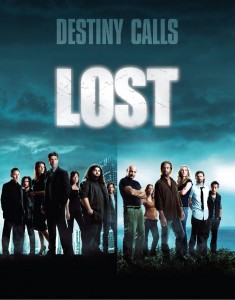
"Oh, hey, Destiny! How's it going? Exactly how you expected? Oh. That's... that's cool."
Last week, we had an excellent conversation in the comments section about the never-ending battle between science and faith in Lost. While we didn’t come to any consensus about whether Jack was truly a man of science, a man of faith, or a mix of the two, last week’s conversation proved beyond a shadow of a doubt that the words “faith” and “science” are far more semantically complex than we once thought. Cool, guys. Keep up the good work.
This week, I want to tackle two more complex—or shall we say vague?—concepts: the concepts of fate and free will. Weeks and weeks and weeks ago, back when I was still watching season two, I made the possibly erroneous claim that “fate” and “destiny” are, by definition, religious terms. In the fifth season of Lost, however, “fate” has taken on numerous definitions, both religious and [psuedo?] scientific. I mentioned in last week’s post that the first half of season five disappointed me, and I think that’s in part because of the vague nature of these terms. What is fate, Lost? What is free will? And can a television show whose characters lack free will be entertaining?
The answers to these questions and more after the jump.
A Lo Hecho, Pecho
If you were to ask an English major what the main theme of Lost was, that English major would probably say, “fate vs. free will.” (Unless that English major went to Yale, in which case she’d probably talk about post-structuralism or third wave feminist motifs or the relationship between Lost and Ulysses. Oh wait. I’m that English major. Shit.)
It seems to me, however, that “fate vs. free will” is a false dichotomy. In reality, Lost is a show about Fate Type A vs. Fate Type B vs. Fate Type C (etc.) vs. Free Will. And some of these types of fate overlap, too, which makes things even more complicated. Let me break it down for you:
Fate Type A: Fate by Time Travel
A.K.A.: Fate, Terminator-style; The Stable Time Loop
Definition: X must happen because it already happened in the future. By which I mean the past.
Example: The entire fifth season of Lost. Eloise Hawking had to kill her son, because she already did. In episode 5.15, Richard had to save Locke’s life after Ethan shot him, because he already did in episode 5.1. In episodes 10 and 11, twelve-year-old Ben Linus physically could not die because he was already alive in the future.
Is it true within the contexts of the show?: It seems to be. So far, “Whatever happened, happened,” happened… with some very minor variations. See below under the section labeled “Fate Type E” for more info.
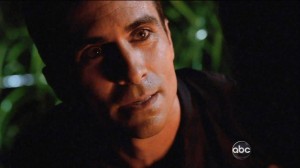
What would have happened if Richard hadn't listened to Dead!Locke and hadn't saved Alive!Locke's life? This is some Back to the Future shit right here.
Fate Type B: Destiny (Relig-y)
A.K.A.: Touched by a Jacob
Definition: Something is fated to happen because a god-like figure “wrote” that it would be so.
Example: It seems the Oceanic Six (except Aaron…maybe) were chosen by Jacob for some unnamed task. By touching them, he set them apart. Likewise, when Locke says, “This is what the Island wants me to do!” he’s talking about this kind of fate.
Is it true within the context of the show?: Probably. Locke was slightly wrong about his fate; he thought the Island had chosen him for some grand purpose, but really it was Esau who chose him for some dastardly purpose. Either way, though, he was chosen. We don’t yet know what Jacob touched the Oceanic Six for, but I’d be shocked if it turned out to be for nothing. I must also assume the thread Jacob was playing with was the thread of fate, which he is using to make a fate tapestry, which he will hang above his fate credenza in his fate sitting room. Yeah, I’m going to stop this metaphor now before it overtakes this whole post.
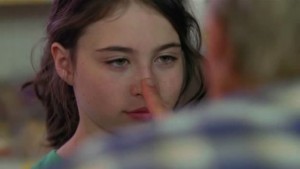
So Jacob goes around touching little children. Interesting.
Fate Type C: Character Is Fate
A.K.A.: Fate is Character; The Child is Father of the Man
Definition: The big events of your life are essentially predetermined by your personality, your genetics, and/or your past.
Example: Jack was “fated” to be a fixer and a hero because A) he was always that way, even as a child, and B) his father pushed him onto that track by telling him he couldn’t do it. (Christian Shephard seems like a “reverse psychology” kind of guy to me.) According to Ben Linus, Sayid was “fated” to be a killer, because he was born to be one. As Sayid says, it’s the only thing he’s ever been really good at. Dan Faraday was born a genius, but he was destined to become a physicist and go to the Island due to a mix of parental pushing and time-travel-related destiny. The character flashbacks in the show often suggest that character decisions in the present are directly affected by their past selves.
Is it true within the context of the show?: Yes for now, but I’m betting, ultimately, that the show will change its mind. I would be shocked, shocked, if Sayid died before coming to the conclusion that his life was determined by his choices, not by his fate or character. And, as I said in an earlier post, I would be shocked if the show didn’t end with Jack screaming (possibly at his Esau-controlled ghost dad) “Don’t tell me what I can’t do!” I’m also expecting at least one character (crossing my fingers for Ben Linus) to make a completely out-of-character sacrifice to save the world. Like:
ESAU: Ben, you HAVE to be evil and manipulative. It’s part of your character. You don’t have it in you to make a heroic sacrifice.
BEN: Yeah, don’t tell me what I can’t do, Esau. Thanks. [Ben Linus saves the Universe.]
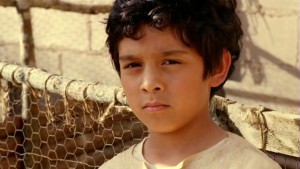
"My name is Sayid Jarrah, and I am a chicken killer."
Fate Type D: Human Nature
A.K.A.: The “Hobbes Was Right” Reading; Lost of the Flies
Definition: This is a “big picture” kind of fate, the kind of fate it seems Jacob’s enemy espouses. It’s this: ultimately, humanity will destroy itself, because humans are naturally evil, violent, and selfish. In a state of nature, their lives will be solitary, nasty, brutish, and short.
Example: From the Jacob-Esau conversation at the start of the season five finale, it seems that different groups have been coming to the Island for years and years and years. And each group’s story ends the same way: they fight, they kill, they destroy, they die. Then the cycle starts again.
Is it true in Lost?: So far, yes, but I’m guessing, ultimately, it won’t be. Jacob claims that each cycle of death is really a revolution in the great wheel of progress. Progress might be slow, but it’ll lead somewhere good, eventually. Since Jacob’s being set up as the ultimate good to Esau’s ultimate evil, it seems this is where Lost’s writers stand, barring any major plot twists. (OMG Jacob is evil! Esau’s good! Claire was the Big Bad all along!) Also, the show’s other big moral seems to be “it’s better to live together than die alone,” a moral that suggests that human life doesn’t necessarily have to be solitary or brutish.
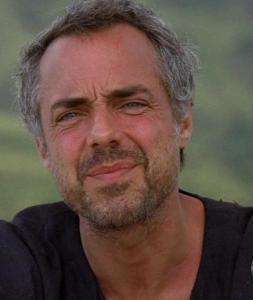
Esau got this way 'cause you turned him down for prom. *sadly shakes head*
Fate Type E: A Mix of Fate and Free Will
A.K.A.: The Course Adjustment Model
Definition: Under this model, the big events in history are fated, but minor things can be nudged and altered slightly along the way.
Example: For instance, Charlie was supposed to die saving Claire’s life, but he didn’t. Desmond was able to change that. However, he wasn’t able to prevent Charlie from dying. The universe course-corrected for that. Claire and Aaron were fated to get on the helicopter, but only Aaron did. (Apparently, Aaron was the important part of that vision, not Claire.) The Oceanic Six weren’t “supposed to” leave the Island, possibly because they were supposed to be around for the time flashes so they could end up in 1977 to cause the Incident. Nevertheless, they got to 1977 anyway. Under this model, most events are fated, but humans can nudge the course little by little along the way. And this might be enough. This might be the “progress” Jacob was referring to.
Is it true?: Unclear. The first episode of season six may clear that up a bit. If the nuclear explosion WAS the Incident, then the universe did course correct. If the nuclear explosion PREVENTED the Incident, then this theory flies out the window.
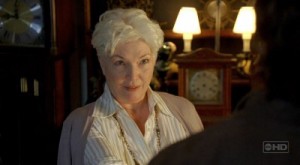
Her car also has a course correction feature.
Fate Type F: A Mix of Fate and Free Will 2.0
A.K.A.: The Big Rock/Small Pebble Model; The Inverse Course Correction Model
Definition: Under this model, time is a river. If you change a little event, it’s like throwing a small pebble into the river. The pebble might feel different, but the river keeps on its regularly-scheduled course. But if you throw a mountain-sized rock in it…
Example: What if, when Ben killed Jacob, that was tantamount to him throwing a mountain-sized rock into the river of time? And what if Juliet’s exploding Jughead was another such rock? It could mean that, from here on out, fate is off the table. Everything that happens in season six, therefore, would not be predetermined by anyone but the writers.
Is it true?: I’m hoping it is, because, let me tell you, watching a show where everything is predetermined is bor-ring. While it was interesting at first to see Action Jack Shephard become a depressive fatalist throughout season four and most of season five, I thanked the TV gods when he finally got back his motivation and decided to blow up the Swan. Watching people allow predetermined events to unfold is boring. Watching people try to fight fate but constantly fail is less boring but more frustrating. Watching people work toward their own goals to change their own destinies makes for exciting television, which is why the second half of season five was much more interesting to me than the first. The plot went from “people get manipulated by time skips and walk around the Island in a time-induced daze” and “people get manipulated by Ben Linus and Eloise Hawking” to “the characters are actually motivated to get off their asses and DO something.”
The loose guidelines* to good dramatic writing usually insist that characters have concrete, believable goals and that they proactively attempt to achieve these goals. Knowing that, let’s consider the following character arcs throughout season five:
Jack, 1st half: Wants to get back to the Island but we don’t know why (vague motivation), and he doesn’t know what he’s doing, so he just trusts Ben for no reason (unbelievable motivation, not very proactive).
Jack, 2nd half: Wants to blow up the Swan (proactive) to prevent the Incident to save all the dead people (a good motivation) and win Kate back (a dumb motivation, but concrete and somewhat believable).
Locke, 1st half: Wants to convince the Oceanic Six to come back to the Island (an okay motivation, although I usually prefer characters to be motivated for personal reasons, not just because the ghost of Jack’s dad told them to do something). He fails… but that’s not the problem. The problem is that we knew back in season four that he was going to fail. We already knew he was going to die, so any scene about his ordeal trying to get back to the mainland and convince the Oceanic Six was already predetermined in the eyes of the viewers. It therefore seemed like the writers were just going through the motions.
Locke, 2nd half: Wants to kill Jacob, because he’s an evil god-like being in disguise (cool, intriguing motivation). He succeeds (proactive).
Kate, 1st half: Wants to keep Aaron (good motivation), but doesn’t really anything to accomplish this goal (not proactive enough).
Kate, 2nd half: Wants to bring Claire home for Aaron’s sake (good motivation), returns to the Island to do so (proactive).
Sawyer, 1st half: Wants the time skips to stop (good, if vague, motivation), but has no idea how to do it. So he just leads people around the Island randomly (not very proactive). Miles even points that out in a later episode when he says, “Walk to the Orchid or the beach? Are those the only two plans you people ever come up with?”
Sawyer, 2nd half: Wants to make a good life for himself and Juliet (good and noble motivation) by stopping Jack from blowing up the Swan, Sayid from killing Ben, etc. (concrete, proactive).
Sayid, 1st half: Wants to help his friends on the Island (a noble, if sort of meaningless, motivation) and avenge his wife’s death (good motivation). So he blindly follows Ben’s advice (dumb, just dumb).
Sayid, 2nd half: Wants to DESTROY BEN LINUS (a very good motivation). So he shoots Ben in the chest (proactive).
Any writing teacher will tell you that a story will be more compelling if the characters have firm, obvious, concrete, believable goals that the audience believes they MAY be able to achieve. It doesn’t really matter if they do achieve the goals or not. Without motivation and without free will, a story becomes rambling, frustrating, and, ultimately, meaningless. Here’s hoping the Lost writers figured that out before writing season six.
So? Fate, free will, or a mix of both? Sound off in the comments!
A note: Starting this week, I’ll be going back to writing posts once every two weeks rather than weekly. I also might start overthinking–gasp!–another series. But don’t worry! I’ll be back to writing about Lost on a weekly basis when the show returns in 2010. Until then, does anyone have any Lost-related topics you want me to cover?
Also: If you haven’t seen this before, watch it:
[http://www.youtube.com/watch?v=EfxPk8Kcb18]
*I say “loose guidelines to good dramatic writing” because A) I’m not fond of rules for writing, and B) I want to allow for great works of art that feature characters without free will or good motivation. Waiting for Godot, for instance, is a favorite of mine, and Slaughterhouse-Five is clearly a work of genius, as well. However, Waiting for Godot was only two hours long, not five seasons. I don’t think anyone would have sat through that shit for five seasons.
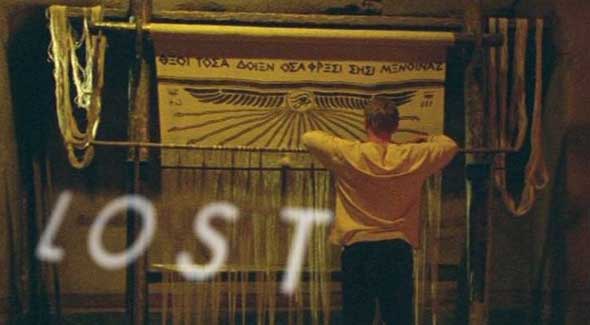
so was that video meta-LOST?
Concerning Fate B example; He didn’t touch only the Oceanic Six: on Jacob’s tapestry there are 9 people depicted on the top row who are kneeling to the Eye of Horus and to two more people who are sitting on opposite sides on the same row as the kneeling people (one on the left side, one on the right). Now, interestingly, in the real world Jacob touches 8 people: Jack, Sayid, Hurley, Kate, Sawyer, Jin, Sun and Locke and on the Island he touches Ben (the 9th person) when he kills Jacob. I’m thinking the two sitting people are Jacob and Mr. X, the Eye of Horus is the Island and all of the 9 people are the people who Jacob touched. Just wanted to point that out. There are more layers with more people and hieroglyphs on it, I wonder what they could mean?
And why is there a Numerology ad on this site?
I’m all for Type E! LIKE DESMOND AND PENNY, RAR!!! But in all seriousness, I think everybody fits it somehow. Another example is Sawyer and Juliet having/wanting a “normal” life together- the Incident probably would have happened with or without their involvement.
Great discussion as always, but I have to point out that in the first half of the season, Sayid never wanted to go back to the island; he only arrived in Los Angeles to protect Hurley from Widmore’s people (which Ben told him about when he was doing his charity work in Santo Domingo). By Season 5, he was already done with his revenge killing and realized he was used by Ben in the process. (We saw the flashback in He’s Our You, but this was well in the past.)
He was the only one taken back to the island against his will, having been Shanghai’d by Ilana, who it turns out was working for Jacob.
re: Ilana – does Jacob actually touch her in the hospital scene? I seem to remember him NOT touching her… but the Tivo deleted “The Incident” before I had a chance to doublecheck.
@theMagician: is there a screengrab of Jacob’s tapestry? I should search Lostpedia… someone’s bound to have it.
@mlawski: I hadn’t really thought of the characters’ (lack of) motivation in the first half of the season… but that’s a very good point, and helpfully illustrated, too.
The only other thing I’d love to hear you take a swing at is the musical score… but I’ve already prattled on about that!
Okay, HERE is a question to overthink and debate: in “He’s Our You,” Sayid seems to pretty clearly shoot Ben right through the heart. But in the following ep, “Whatever Happened…”, Ben’s wound seems to be… lower and off to the other side, where it hasn’t done as much damage. The question fans have debated is this: was this a continuity error on the crew’s part… or is this an example of the island working its magic?
@pave: No, meta-Lost would be if season six opened with 40-something people crash landing on a couch in a living room, where they’re forced to watch the first five seasons of Lost by some mysterious god-like figure.
@TheMagician: Cool, I didn’t notice that tapestry stuff. I don’t notice a lot of things. Also: there’s a numerology ad on the site? Sweet!
@ArtDeco: Ah, I think the problem is the lack of clarity in my writing. Sorry! I didn’t mean to suggest Sayid wanted to go back to the Island. I only meant that the way Ben got him to go after the “economist,” the golf-playing man, and so on was to say, “You need to kill these people to help your friends.” I shouldn’t have written “on the Island,” because clearly Sayid thought killing those guys would also help Hurley, Kate, and the rest from being murdered in their beds.
@Kevin: Don’t know about Ben’s mysteriously shifting wound, but I just saw the kid who plays his 12-year-old self on a rerun of Scrubs and it startled the hell out of me. I was like, “Dr. Cox run awayyyyyyy!!!” (Then the kid got cancer.)
Keep the comments coming!
I nominate for the next Overthinking Lost the topic of how in the world Widmore (and Ben) got to be so rich and powerful despite spending all or most of their adult lives on the island.
I mean, how does Widmore become so rich that he can stage a fake plane crash, complete with bodies, etc. despite not leaving the island until he was in his 50s? Perhaps Faraday stuck a few sports scores in his journal so Widmore was able to get rich a la Biff Tannen.
And Ben’s apparent wealth or access to money is even more inexplicable given that he was a “work man” until he was 30 or so, and spent the rest of his life leading the rag-tag Others on the island.
I don’t see the Hansos funding either since they were both responsible for exterminating the Dharma Initiative. Any thoughts?
@Art Deco: hmm, good questions. Assuming the money isn’t counterfeit, there’s definitely SOME kind of large support network off the island. (OKAY, that’s another one of the big things I want answered in S6 — who are all the people helping Ben off-island? Like the Butcher Lady in S5?) I always assumed Widmore somehow used his island knowledge — possibly via time-travel — to quickly amass his fortune… but honestly, never gave it much thought. Plus, they can make fake passports pretty quickly… hmm.
Actually, maybe it can be explained with the following, and let’s open this up to discussion:
In the 21st century — meaning, at the time of the plane crash, return of the Oceanic 6, our “present day” — does the Dharma Initiative still exist?
Most people will say “No, Ben killed everyone in the Purge.” But I’m not talking about on the island — I mean everyone back in Ann Arbor and elsewhere, like the DeGroots and so on. Everyone who, until now, has only been mentioned off the show.
My guess is that we’ll discover in S6 that off the island, the Dharma Initiative/Hanso Foundation is still plugging away, and that Ben’s people are tricking them until continuing to send supplies, equipment, food, etc. (Don’t forget the food drop in S2…) Or perhaps Ben’s people have infiltrated the D.I. off the island.
Of course, now that I’ve said that — Ben’s been blocking communication to and from the island for a couple of months as of S3. So they had to have known there was something wrong on the island… maybe? I don’t know!
(a few corrections to the above post:
1. I think the DeGroots were officially mentioned on the show, in the Swan “Orientation” filmstrip back in S2… and not just in podcasts/ARGs and such; and
2. The second-to-last paragraph above should read “…Ben’s people are tricking them INTO continuing to send supplies…” Also, by that I mean since there are still Others manning most of the stations from time to time — like Patchy in The Flame — it would be easy for Ben and friends to send messages back to the mainland D.I. as if everything is just fine.)
Speaking of corrections, and how the D.I. made its money, here’s a funny story: some eagle-eyed viewer last season wrote the creators a mail regarding the Dharma beer cans on the island. “Flip tops weren’t invented in the 70s — they were still using pull tabs back then. BUSTED!”
They replied back on a podcast: “Who’s to say Dharma didn’t INVENT flip tops on aluminum cans in the first place? Indeed, how do you think they got the money to fund the Dharma Initiative? BY LICENSING FLIP TOP TECHNOLOGY for aluminum cans!!!”
I always thought that was a great way for them to explain away a continuity error, while (humorously) helping to give some backstory to a plot point…
@Art Deco: Indeed, Hanso Foundation cut Dharma Initiative’s funds off in 1987, but you should watch the newest video in the currently running ARG, it’s called “Mysteries of the Universe, part 3” (link below), they reveal that “records state that this church [showing Eloise Hawking’s church that Dharma used to find the Island] have received funds upward of 1.5 million dollars from a private organization.” Then they show a check that has the Swan station logo on it. They also reveal that their researchers “have found 100s of invoices for enough supplies to sustain a colony for quite some time.” I think that we can conclude that these private organizations (although it’s possible that only Hanso Foundation has sent money to the Island) have sent so much money to the Island that whoever has access to that money is a rich mofo, and that someone right now is Ben. I don’t know how Widmore got so rich and powerful in the real world, but this would explain how Ben has so much money.
Mysteries of the Universe, part 3: http://darkufo.blogspot.com/2009/09/mysteries-of-universe-part-3.html
@mlawski, you should analyze these videos! Would make for good articles, but then you should also watch the videos that were in The Lost Experience ARG.
I always assumed that Widmore *came from* money in the first place. I mean, was he born on the island? It’s never entirely clear where he comes from. Or perhaps he married into money (Penny’s mother’s family??) Regardless, he had myriad off-island connections – he was one of the Other’s main “real world” liaisons, right? I need to go back and re-watch his key episodes. Everything regarding him is quite confusing, in large part because he lies so much (doesn’t he tell Locke that Ben fooled him into leaving the island? but then we see him being exiled for having an off-island affair that resulted – we assume, unless he has MORE kids – in Penny.)
As for Jacob’s touching… I’ve thought a lot about that, and I think there’s something to it that’s more than just singling people out. I think it’s almost like a mark of protection or something. (perhaps akin to the way that “the island” doesn’t seem to let people die if they still have a purpose) I mean, several of the people he touches, he might have literally saved their lives: Sayid (if he hadn’t been asked for directions, he would’ve been in the middle of the street *with* Nadia when she was hit;) Locke (could he *really* have survived that fall? Maybe Jacob’s touch actually brought him back to life.) Others, it was more subtle: Kate (how would Kate’s crazy violent father have reacted if she’d been brought home by the cops for shoplifting?); Sawyer (if he hadn’t been able to get his feelings out on paper, his grief and anger could easily have taken him to a self-destructive place.) With Sun and Jin, it could’ve been a different sort of protection: a binding on their marriage, perhaps? (With everything stacked against them, and everything that went wrong, they really should’ve been separated long before they came to the island. It’s a miracle they lasted so long. (also, Jin survived some particularly certain-death-like scenarios, and Sun was *really* pushing things wrt “how long pregnant women survive on the island.”)) Jack… might have also been at a self-destructive cross-roads… Hurley… yeah, I got nothin’ there. Maybe we’ll see the result of that in S6?
Speaking of S6, the Dharma Initiative, and so on…
…any thoughts on the “Mysteries of the Universe” videos ABC has been putting out over the last month or so?
http://www.youtube.com/watch?v=i_K6tSOahf0